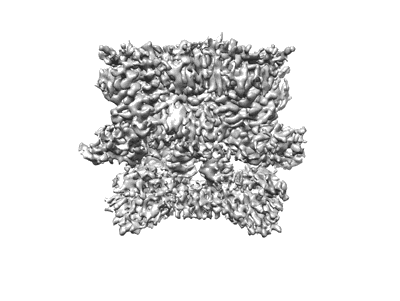EMD-35883
Human KCNQ2-CaM-HN37 complex in the presence of PIP2
EMD-35883
Single-particle2.7 Å
 Deposition: 09/04/2023
Deposition: 09/04/2023Map released: 06/12/2023
Last modified: 06/12/2023
Sample Organism:
Homo sapiens
Sample: Human KCNQ2-CaM-HN37 complex in the presence of PIP2
Fitted models: 8j04 (Avg. Q-score: 0.329)
Deposition Authors: Ma D ,
Li X,
Guo J
,
Li X,
Guo J 
Sample: Human KCNQ2-CaM-HN37 complex in the presence of PIP2
Fitted models: 8j04 (Avg. Q-score: 0.329)
Deposition Authors: Ma D
 ,
Li X,
Guo J
,
Li X,
Guo J 
Ligand activation mechanisms of human KCNQ2 channel.
Ma D  ,
Zheng Y,
Li X,
Zhou X,
Yang Z,
Zhang Y,
Wang L,
Zhang W,
Fang J,
Zhao G,
Hou P,
Nan F,
Yang W
,
Zheng Y,
Li X,
Zhou X,
Yang Z,
Zhang Y,
Wang L,
Zhang W,
Fang J,
Zhao G,
Hou P,
Nan F,
Yang W  ,
Su N
,
Su N  ,
Gao Z
,
Gao Z  ,
Guo J
,
Guo J 
(2023) Nat Commun , 14 , 6632 - 6632
 ,
Zheng Y,
Li X,
Zhou X,
Yang Z,
Zhang Y,
Wang L,
Zhang W,
Fang J,
Zhao G,
Hou P,
Nan F,
Yang W
,
Zheng Y,
Li X,
Zhou X,
Yang Z,
Zhang Y,
Wang L,
Zhang W,
Fang J,
Zhao G,
Hou P,
Nan F,
Yang W  ,
Su N
,
Su N  ,
Gao Z
,
Gao Z  ,
Guo J
,
Guo J 
(2023) Nat Commun , 14 , 6632 - 6632
Abstract:
The human voltage-gated potassium channel KCNQ2/KCNQ3 carries the neuronal M-current, which helps to stabilize the membrane potential. KCNQ2 can be activated by analgesics and antiepileptic drugs but their activation mechanisms remain unclear. Here we report cryo-electron microscopy (cryo-EM) structures of human KCNQ2-CaM in complex with three activators, namely the antiepileptic drug cannabidiol (CBD), the lipid phosphatidylinositol 4,5-bisphosphate (PIP2), and HN37 (pynegabine), an antiepileptic drug in the clinical trial, in an either closed or open conformation. The activator-bound structures, along with electrophysiology analyses, reveal the binding modes of two CBD, one PIP2, and two HN37 molecules in each KCNQ2 subunit, and elucidate their activation mechanisms on the KCNQ2 channel. These structures may guide the development of antiepileptic drugs and analgesics that target KCNQ2.
The human voltage-gated potassium channel KCNQ2/KCNQ3 carries the neuronal M-current, which helps to stabilize the membrane potential. KCNQ2 can be activated by analgesics and antiepileptic drugs but their activation mechanisms remain unclear. Here we report cryo-electron microscopy (cryo-EM) structures of human KCNQ2-CaM in complex with three activators, namely the antiepileptic drug cannabidiol (CBD), the lipid phosphatidylinositol 4,5-bisphosphate (PIP2), and HN37 (pynegabine), an antiepileptic drug in the clinical trial, in an either closed or open conformation. The activator-bound structures, along with electrophysiology analyses, reveal the binding modes of two CBD, one PIP2, and two HN37 molecules in each KCNQ2 subunit, and elucidate their activation mechanisms on the KCNQ2 channel. These structures may guide the development of antiepileptic drugs and analgesics that target KCNQ2.
